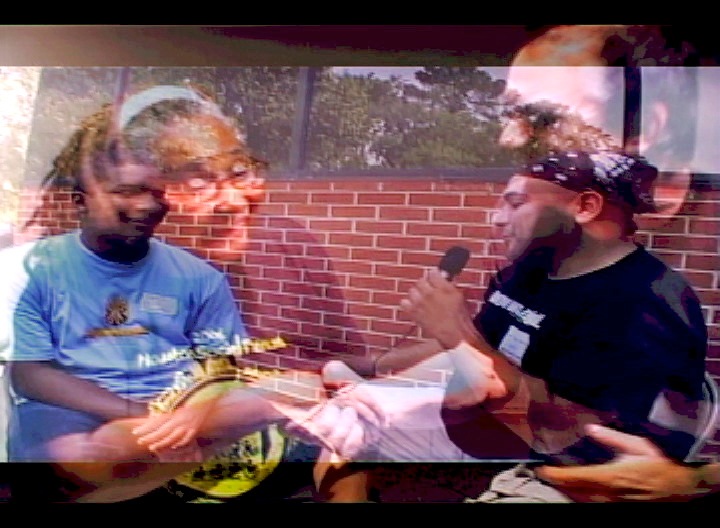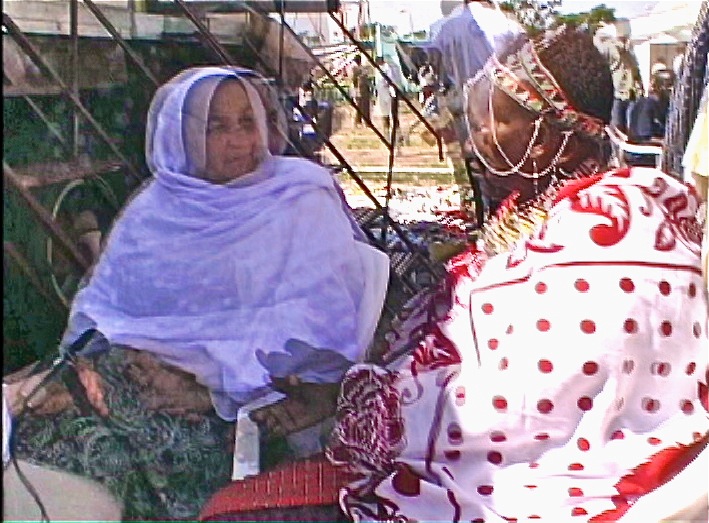JEMAGWGA Gwylene Gallimard & Jean-Marie Maucletjemagwga@gmail.com
You Comin’
What we often call The Charleston Rhizome of Alternate ROOTS is centered on creating collaborative art works, which strengthen community. Our group is diverse in race, age, income, talent, education, professional occupation … and this is reflected in the activities and projects it initiates. We are activists, artists and educators. Diversity is our natural resource, our high-octane, renewable fuel. Many of us are born and raised in Charleston or the South; some of us born and/or educated in the North; a minority of us are 1st generation immigrants. We may well represent the Charleston of the future.
“YOU COMIN‘,” part one
and YOU COMIN.org,
part two
The following article was published in UP FROM THE ROOTS, spring 2007
A short background of the Charleston Rhizome:
Many regular members of the Rhizome have been participating in various Spoleto projects as artists, educators or administrator assistants. To name but a few: “Places with a Past: site-specific Art in Charleston”, “Rehearsing the Past”, “Making Art Making Home” (a partnership with Alternate ROOTS Resources for Social Change).
Other projects strive on differences, randomness and the unpredictable.
For example: “Switching roles – Jumping fences” started as an electronic dialogue on race; it ended up as a public reading at the City Gallery at Waterfront Park, where you would perform someone else’s piece, picked from a hat. For “Changing the Beat” (a full weekend held at the Rutledge Humanity Foundation Center), we invited performers to break away from the group they belonged to and improvise with artists they had never met. They had two days to perfect and present a piece to an audience, built up around the concept of “critical response”. Carlton Turner acted as a facilitator for the weekend. Our collective and members of the collective have received project funding from Spoleto Festival USA, the Charleston Office of Cultural Affairs, the SC Arts Commission, the Coastal Community Foundation, the SC Humanities Council and Alternate ROOTS.
The Charleston Rhizome of ROOTS started around the following format: presentation of an art work or a project by a member, open discussion pointing to the specific qualities of the work and its relevance in a world torn apart by institutional violence, racism, free trade, privatization and challenged to attain quality education for all, fair trade, sustainability and social justice. Then, we eat together! In reality, it is our constant effort to remain grounded in earthbound activities for the sake of escaping the consequences of misinformation, generalities, ideologies.
The Charleston Rhizome was born thanks to the work in regions of Alternate ROOTS.
 How we got involved in the Social Forums?
How we got involved in the Social Forums?
We understand that the obligatory word “globalization”, the code name for neoconservative, one-sided, one-size-fits-all, economic solutions to the world woes, is in denial of what precisely makes it what it is: its diversity. We work for full acceptance of diversity. On those bases we use community-based arts to experiment ways of collaborating across disciplines, races and social classes. Very naturally we have been developing a deep interest in the Social Forums. We want to guarantee the arts an important role in the many Social Forums taking place around the World. From “Another South is possible” (Durham – June 2006) and “Another world is possible” (Nairobi- January 2007), to “Another US is possible” (Atlanta – June 2007), we intend to develop further two projects:
– One is a textile project: an “endless” batik banner composed of words and images by Forum participants. It is dyed in indigo and other colors.
– The other is a video work made of very short dialogues between folks who never met before but are sharing the present experience of the Forum. Our team introduces them to each other, creates those mini-events, briefs them on the purpose of the film and centers the dialogue on two questions: Why are you here? What do you want to bring back from here?
Eight of us went to Nairobi (Kenya), the World Social Forum and AFRICA.
Coming back from the South East Social Forum in Durham, Lasheia said: “I am going to Africa”. We talked. Why to go there?
– To deepen our understanding of both the similarity of worldwide problems and the diversity of answers to them. Like women’s rights, health, education, access to water, right to shelter.
– To gain insight into the local/global dynamics.
– To go there, to be there, where history is in the making … Many colors, many accents, many hopes for a better world.
– To see Africa, some of our roots. To bring a son’s spirit there, give him a home.
– To see a mosque. To see the schools and the wildlife. To be energized…
In November Amy Cook, Arianne King Comer, Gwylene Gallimard, Pamela Gibbs, Jean-Mare Mauclet, Lasheia Outré, Rebekah Stone and Latonnya Wallace joined forces to find the cheapest ways to go to Nairobi.
What do we bring back from there?
Understanding, ideas, more hope, all based on the experience of looking at you, and you, and you, in the eye. An alternative to discourse, political speech and dialectics to surpass national identity, religion, race and to motivate others to do the same in their own communities. We also bring back our own personal reactions to feeding or sheltering ourselves in unknown territories. Our group had never traveled together, was very colorful, young and older, black and white. Our experiences with planes, borders, visas, vaccines, foreign moneys and every non-specifically American-type stuffs were very different. But we were complementary in a search for understanding that big wide world. Each personal reaction modified all our perceptions or pre-conceived decisions. Despite being very tired sometimes, we often communicated with superb humor. Jean-Marie could have seven wives in the Massaï country and some of us are permanently listed as children of others on the hotel file. Eight adults staying in two small rooms with one queen and one single bed was apparently not an acceptable situation for foreigners. We also fought for a rule that was totally against the principles of such forums. We were not going to pay the “Northern Countries” fee to enter the forum. It was outrageous. We were not representing Mr. Bush and capitalism. The forum could not discriminate on the basis of nationalities. After all we were from South Carolina and had registered an activity. Pam took the lead. And we won.
The JOURNEY for us is not over.
Indeed we brought more video conversations and more length for this endless batik banner. Our video conversations are not a documentary of the Forums. We bring back a visual understanding of how our actions and decisions can propel personal voices and stories. We do believe in promoting personal voices without always the interference of a middleman, a mediator, an interviewer or a newsman. Our ways of introducing strangers together in front of a non-invading camera is a tool maybe as powerful in some situations as a Story Circle. As a team of artists and non-artists we wanted to be actors in the forums, not only viewers and documenters. We have not yet reviewed and edited the 59 conversations we created in Nairobi. But we all remember being so moved many times. How not to be moved when a widow from India and a widow from Tanzania discover, thanks to us, that they do have the same issue, the same despair and still some hopes? And how not to be moved by a personal invitation from a Korogocho slum tenant’? We went there and registered the full impact of that evening: on each of us, and on the people we met. What did we bring to them as visitors? What did we exchange with the kids we played with for a couple of hours? What did we exchange with the people we danced with? What did we bring to Amy who served us tea and bread in her tiny home? What are our responsibilities vis-à-vis them now? Because of the force of the impact of this evening on each of us it seems that our film will address some of those questions. We also look at how we are bringing home those conversations with a world much wider than a family, much wider than a block, a neighborhood, a school, a workplace, a city, the South or our country. And what about the human species next to herds of elephants – not one in a zoo -, gazelles, zebras, wildebeests, chittas etc. and believe it or not the pelicans are white over there! And they watch the Kilimanjaro way above the clouds!
 And now are YOU COMIN’?
And now are YOU COMIN’?
The US Social Forum is around the corner: Atlanta June 27 through July 1 2007.
The South Carolina Rhizome is now partnering with the Healing, Health & Environmental Justice Local Team of USSF. The Charleston Rhizome Collective will continue creating and recording conversations between people who have never met. This time the questions are being chosen with the Healing, Health & Environmental Justice Local Team of USSF. We would like to use this opportunity to introduce you to our process and yes, you can participate! Depending on the number of cameras and the number of people interested in our ways of creating conversations we may animate the streets, the Health tent or any other venue at any time of the forum. Any volunteer is welcome. Cameras do not have to be professional.
If you are interested or know any youth who maybe interested, let us know at jemagwga@gmail.com
This project is part of a 2007 Alternate ROOTS C/APP grant.
Gwylene Gallimard/Jean-Marie Mauclet (includes notes from others Charleston Rhizome Collective members)
